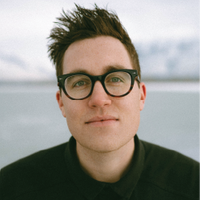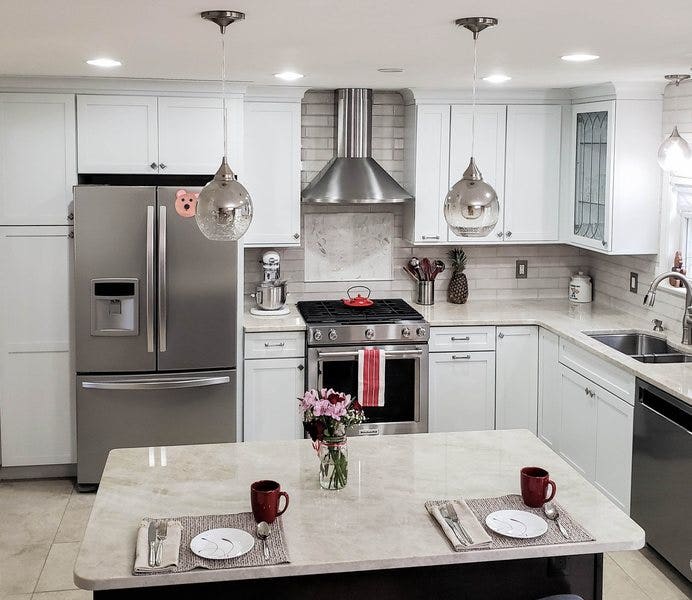Whether you’re a casual or avid cook, safety should be a top priority in the kitchen. When cooking, grease, smoke, and contaminants fill your kitchen. Without proper ventilation, you’ll end up with poor indoor air quality. Not to mention grease gets all over your walls, counters, and appliances.
But air quality shouldn’t be your only concern. Grease fires can also occur. If not dealt with properly, these can be quite dangerous for you and your family.
A range hood helps reduce the risk of a grease fire. It moves hot air and grease particles outside your home so you can enjoy clean air. It also keeps your smoke alarm from going off so you’ll have some peace and quiet in the kitchen. Be sure to watch your burners closely and clean your stove consistently to further reduce the risk of a grease fire.
To keep heavy grease and smoke out of your kitchen, your best bet is a ducted range hood. It moves all the dirty air and grease out of your home, while a ductless hood just recirculates the air.
Can range hoods cause a fire?
It is extremely unlikely that a range hood will cause a fire in your home. To ensure your kitchen is safe, be sure to mount your range hood between 28 and 36 inches from the cooktop. For outdoor hoods, mount them between 36 and 42 inches from the cooktop. Also, clean your range hood filters to prevent grease buildup.
If your hood is too close to the kitchen range, it may become damaged. A fire could start in your home if the hood is exposed to intense heat for too long.
But, this is incredibly rare. Just make sure to follow our guidelines on mounting height here and clean your filters, then you won’t have anything to worry about.
Occasionally, you’ll receive a hood that doesn’t work. Or something might be wrong with the motor. In that case, call the manufacturer and return your hood as soon as possible. Don’t install or run the hood if it’s not working properly.
When you purchase your range hood, make sure you are aware of the return policy, too. You don’t want to be stuck with a hood that doesn’t work.

How do you prevent a grease fire?
- If you’re frying, watch the thermometer carefully so you don’t heat oil past its smoke point.
- Always watch your food when the burners are on.
- Clean your stove approximately every four to six weeks.
- Be careful to avoid oil splatter when frying.
- Put lids on your pots and pans whenever possible.
- Keep towels, oven mitts, trivets, and other kitchen accessories away from the stove.
- Only fry dry foods; never put frozen food in your fryer at home. Oil and water don’t mix, so as they separate, your fryer may overflow.
Why is grease buildup dangerous?
Grease is flammable, so grease buildup significantly increases the risk of fire in your kitchen. If left unattended, this can lead to property damage, injuries, or even death. To mitigate grease buildup, invest in a professional range hood. It will keep the grease and oil particles at bay so you can cook safely.
How common are grease fires?
A 2020 report by the National Fire Protection Association showed that from 2014 - 2018, cooking was the number one cause of reported home fires and home fire injuries. Leaving equipment unattended led to about 30% of fires and over 50% of deaths during that period.
Take a look at the full report here.
Is burning grease harmful?
Yes, burning grease is incredibly harmful. Contact with skin can lead to severe second or third degree burns. Never douse a grease fire with water. It will splatter and may burn your skin. The fire may also spread to other areas of the kitchen like floors, counters, or walls.
How hot can a grease fire get?
Most grease fires start when cooking oil reaches its smoke point around 400 to 450 degrees.
What's the worst thing to put on a grease fire?
Never put water over a grease fire. It will splatter which may cause more injuries and spread the fire. Instead, use a fire extinguisher. For small fires, douse them with salt or baking soda and cover the area with a lid.
Is burning cooking oil toxic?
If oil reaches past its smoke point, it may produce compounds that cause cancer and heart problems. You don’t want to breathe those in! If you notice oil starting to smoke, turn off the burner and open windows and doors to improve ventilation. Burning oil produces heavy smoke which leads to poor indoor air quality. Cooking fumes from oil can be especially harmful for sensitive groups with lung problems or asthma, according to this study.
How long does it take an unattended pan of grease to catch fire?
It can take anywhere from just twenty seconds to a minute or more for a pan to catch fire. It’s important to stay in your kitchen when you’re doing any frying. Watch the temperature carefully and be careful when submerging food in oil. You want to keep the splatter down to a minimum. Always use a lid when frying to reduce the risk of a grease fire.
What is the purpose of a hood over a stove?
A range hood keeps smoke, grease, and unwanted contaminants from building up in your kitchen. It vents them to the outside of your home so you can enjoy clean and fresh kitchen air. Your best bet is a professional hood because of its exceptional power and durability.
How important is a range hood?
We recommend a range hood in every kitchen, no matter your cooking style. It is more important for those who cook a lot or enjoy frying and grilling. But everyone can benefit from better air quality and less cooking odors! If you’re still skeptical, take a look at our article ‘Do I need a range hood?’ It’s packed with great information to help you find the best range hood for you!
Related Articles
5 Best Proline Island Range Hoods
111 Inspirational Kitchen Hood Ideas












